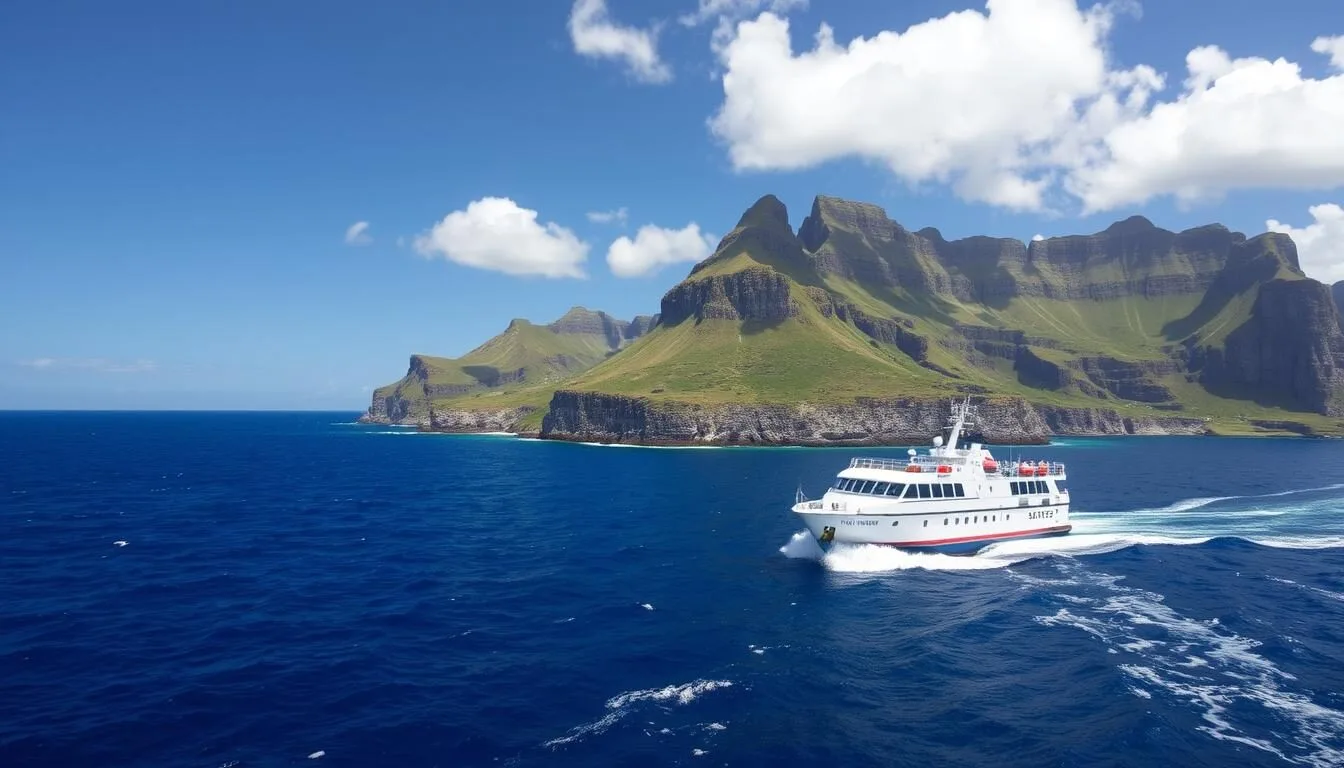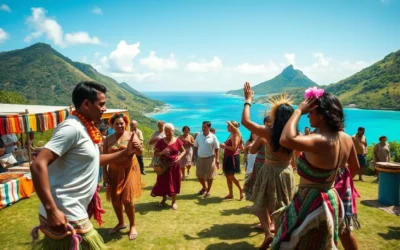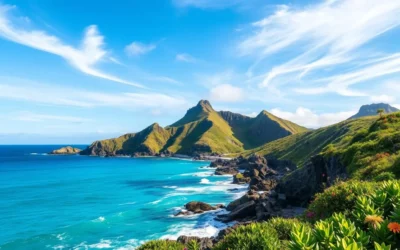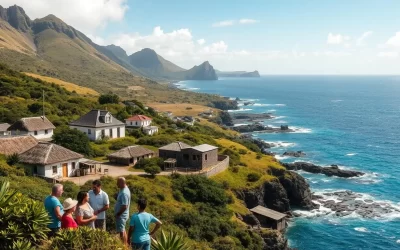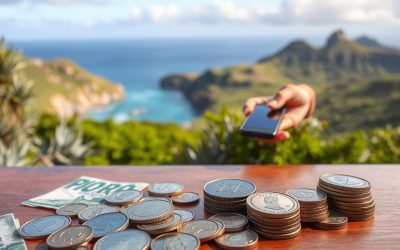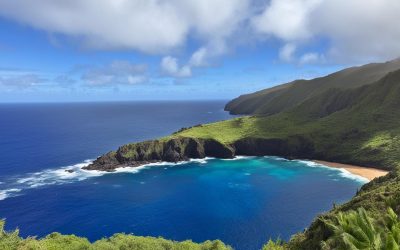Did you know Adamstown is the world’s smallest capital city, with fewer than 50 residents? This remote settlement on Pitcairn Island is home to descendants of the HMS Bounty mutineers who settled here in 1790. Despite its tiny size and extreme isolation—it’s over 3,000 miles from New Zealand—this Pacific paradise offers a surprising wealth of activities, stunning natural beauty, and a fascinating historical legacy that few travelers ever get to experience.
Getting to Pitcairn Island: Your Journey to Paradise
The MV Silver Supporter approaching Pitcairn Island
Reaching Adamstown is an adventure in itself and requires careful planning. The journey begins with a flight to Tahiti, followed by a connection to Mangareva in French Polynesia. From there, you’ll board the MV Silver Supporter for a 32-hour sea journey to Pitcairn Island. This passenger vessel is currently the only regular transportation to the island, operating approximately once every three months.
Flight Routes and Connections
Your journey starts with booking a flight to Papeete, Tahiti. From there, Air Tahiti offers twice-weekly flights (Tuesdays and Saturdays) to Mangareva in the Gambier Islands. This remote airport is your gateway to Pitcairn. Plan to arrive at least one day before your scheduled departure to Pitcairn to avoid any complications.
Ready to Begin Your Pitcairn Adventure?
Search for flights to Tahiti and start your journey to one of the world’s most remote destinations.
Sea Journey from Mangareva
The MV Silver Supporter departs from Mangareva for Pitcairn approximately four times per year. The crossing takes about 32 hours and offers a true sense of the island’s isolation. The ship typically stays at Pitcairn for 4-11 days before returning, so plan your visit accordingly. For the latest schedule and booking information, check with the Pitcairn Islands Tourism website.
Best Time to Visit
The optimal time to visit Adamstown is during the cooler, drier months from June to August. The weather is more pleasant for exploring, with temperatures averaging around 19°C (66°F). The summer months (November to March) can bring heavy rainfall, making the island’s dirt roads difficult to navigate. Remember that for stays over 14 days, you’ll need to complete an entry application form.
Exploring Adamstown: The World’s Smallest Capital

Aerial view of Adamstown, the world’s smallest capital
Adamstown may be tiny, but it’s packed with historical significance and community charm. The settlement consists of just a handful of buildings, including the Pitcairn Islands Museum, the post office, the public hall, and the Seventh-day Adventist Church. Walking through the town square, you’ll get a genuine glimpse into the daily life of this unique community.
Pitcairn Islands Museum
The museum houses an impressive collection of artifacts from the HMS Bounty, including the ship’s bible and anchor. You’ll also find displays detailing the island’s Polynesian heritage and the story of the mutineers who settled here. The museum is typically open three days a week, but locals are often willing to open it upon request for visitors.
Town Square and Public Buildings
The central square is the heart of community life in Adamstown. Here you’ll find the post office, which sells the island’s famous stamps, a treasury office, and the public hall where community events are held. Don’t miss the Bounty cannon displayed in front of the hall—a tangible piece of the island’s famous history.
| Building | Function | Opening Hours |
| Pitcairn Islands Museum | Historical artifacts and exhibits | Three days weekly, 10am-11am (or by request) |
| Post Office | Mail services and stamp sales | Three days weekly, 10am-11am |
| Public Hall | Community gatherings and events | For scheduled events or by request |
| Seventh-day Adventist Church | Religious services | Saturday services, visitors welcome |
As you explore Adamstown, you’ll notice the islanders speak both English and Pitkern, a unique language that blends 18th-century English with Tahitian. The community is largely self-sufficient, using solar power and practicing sustainable living methods that have allowed them to thrive in this remote location for generations.
Historical Legacy of HMS Bounty

The HMS Bounty’s anchor on display in Adamstown
The Mutiny Story
The history of Pitcairn Island is inextricably linked to one of history’s most famous maritime rebellions. In 1789, Fletcher Christian led a mutiny aboard the HMS Bounty against Captain William Bligh. Christian and his fellow mutineers, along with several Tahitian companions, eventually found refuge on uninhabited Pitcairn Island in 1790. To avoid detection, they burned the Bounty in what is now known as Bounty Bay.
This dramatic history has shaped every aspect of life on the island. Today’s residents are direct descendants of these original settlers, making Pitcairn a living museum of this remarkable historical event.
Bounty Bay Landing Site
A visit to Bounty Bay allows you to stand where the mutineers first came ashore. At low tide, you can sometimes glimpse remains of the Bounty underwater. The bay also serves as the island’s main landing point, where supplies and visitors arrive by longboat—a challenging process that demonstrates the skill of the local boatmen and the island’s continued isolation.

Underwater remains of the HMS Bounty in Bounty Bay
John Adams’ Grave
John Adams was the last surviving mutineer on Pitcairn, living until 1829. After the violent early years of settlement, Adams underwent a religious conversion and established a peaceful, Christian community. His grave is located on a hill just east of the town square and is an important historical site that connects visitors to the island’s founding story.
“The Bounty mutiny story is deeply intertwined with Pitcairn’s culture, affecting every aspect of island life from governance to traditions.”
Adamstown, Pitcairn: Best Things to Do – Top Picks

The hiking trail to Christian’s Cave offers breathtaking views
Despite its small size, Pitcairn Island offers a surprising variety of activities for visitors. From historical sites to natural wonders, here are the must-do experiences during your stay in Adamstown.
Christian’s Cave
This historic cave is where Fletcher Christian reportedly watched for passing ships. The one-hour hike to reach it is moderately challenging but rewards you with spectacular views of the island and surrounding ocean. Local guides can enhance your experience with stories about the cave’s significance in the island’s history.
Pawala Valley Ridge
For the best panoramic views on the island, hike to Pawala Valley Ridge. This two-hour round trip takes you to one of the highest points on Pitcairn, offering breathtaking vistas of the rugged coastline and lush interior. The trail can be steep in places, so proper footwear is essential.
St. Paul’s Pool

The natural saltwater pool at St. Paul’s Pool
This natural saltwater pool on the eastern side of the island offers a safe and scenic swimming spot. Protected from the open ocean by volcanic rocks, the crystal-clear waters are perfect for snorkeling and cooling off after a hike. The one-hour walk to reach St. Paul’s Pool is relatively easy and suitable for most visitors.
Down Rope Petroglyphs
For a glimpse into Pitcairn’s pre-European history, visit the ancient Polynesian petroglyphs at Down Rope. This challenging 45-minute hike takes you down a cliff face (with the aid of a rope, hence the name) to see these fascinating rock carvings and a secluded beach. The site provides evidence that Polynesians visited the island long before the Bounty mutineers arrived.
Plan Your Pitcairn Island Adventure
Ready to explore these unique attractions? Book your accommodations now to secure your spot on this remote island paradise.
| Activity | Duration | Difficulty | Highlights |
| Christian’s Cave | 1 hour hike | Moderate | Historical site, panoramic views |
| Pawala Valley Ridge | 2 hours round trip | Moderate | Highest viewpoint, island vistas |
| St. Paul’s Pool | 1 hour hike | Easy | Swimming, snorkeling, natural beauty |
| Down Rope Petroglyphs | 45 minutes hike | Challenging | Ancient carvings, secluded beach |
Natural Wonders and Scenic Spots

The dramatic coastline of Pitcairn Island
Pitcairn Island’s natural beauty is one of its greatest attractions. The untouched landscapes offer photographers and nature lovers plenty to explore, from dramatic coastlines to lush interior valleys.
The Edge Viewpoint
Located at the end of a challenging hike up the aptly named “Hill of Difficulty,” The Edge offers spectacular views of the island’s western coastline. On clear days, you can see for miles across the Pacific Ocean. The viewpoint is accessible via a marked trail from Adamstown, taking approximately 1.5 hours to reach.
Gudgeon
This sea-level cave on the southwest side of the island hides a sandy beach within its spacious interior. Carved by centuries of wave action, Gudgeon provides a unique perspective of the island’s volcanic geology. Access requires a guide and good timing with the tides, as the cave can only be safely entered during certain conditions.
Taro Ground
The largest flat area on the island, Taro Ground in southern Pitcairn was traditionally used for growing taro, a staple crop. Today, it houses the island’s ham radio station, which has historically been Pitcairn’s lifeline to the outside world. The area offers pleasant walking with views of cultivated gardens and native plants.
“Pitcairn’s natural landscapes are a true testament to the island’s untouched beauty. From serene pools to awe-inspiring coastal views, every moment spent exploring this remote paradise is a feast for the senses.”
Cultural Experiences and Local Life

A local craftsman demonstrating traditional Pitcairn woodcarving
Immersing yourself in Pitcairn’s unique culture is an essential part of any visit to Adamstown. The island’s small community offers genuine interactions and insights into a way of life shaped by isolation and resilience.
Community Dinners
Join the islanders for a community potluck dinner, where you can sample traditional Pitcairn cuisine and engage in conversation with the locals. These gatherings typically feature seafood dishes, tropical fruits, and recipes passed down through generations. Ask your host about upcoming community events during your stay.
Pitkern Language
Listen for the unique Pitkern dialect, a fascinating blend of 18th-century English and Tahitian that evolved among the original settlers. While all islanders speak English, hearing the local language provides insight into the island’s cultural heritage. Some residents offer informal language lessons for interested visitors.
Traditional Crafts
Pitcairn is known for its handcrafted souvenirs, particularly items made from miro wood and other local materials. Visit local artisans to see how they create intricate carvings, woven baskets, and other traditional crafts. These items make meaningful souvenirs that support the island’s economy.

Traditional Pitcairn crafts including wooden carvings and woven items
- Participate in a homestay with a local family to experience daily island life
- Join community dinners to taste traditional Pitcairn cuisine
- Learn about the Pitkern dialect, a unique blend of English and Tahitian
- Observe traditional crafting techniques for wood carving and weaving
- Visit during Bounty Day (January 23) to experience the island’s main celebration
Accommodation Guide

A typical Pitcairn Island homestay with garden and ocean view
Accommodation on Pitcairn Island is limited but authentic, offering a genuine experience of island life. Most visitors stay in homestays or guesthouses run by local families, providing an opportunity to connect with the community and learn about their unique way of life.
Homestays and Guesthouses
Staying with a local family is the most common and rewarding accommodation option on Pitcairn. Homestays typically include three meals daily and give you insight into authentic island living. Popular options include Down Alwyn’s, Big Fence, and Plas Pitcairn Chalet. Rates start at approximately US$70-100 per person per night, including meals.
A few self-contained bungalows are also available for those preferring more privacy. These typically include kitchen facilities but may not include meals. Jacq’s Place offers both accommodation and wellness treatments like massage and acupuncture.
Book Your Pitcairn Island Stay
Secure your accommodation early as options are limited on this remote island.
Booking Tips
Due to the island’s limited capacity, it’s essential to book accommodation well in advance of your trip. Contact the Pitcairn Islands Tourism office or reach out directly to homestay providers. For stays longer than 14 days, you’ll need to arrange accommodation before applying for your visitor permit.
What to Expect
Accommodations on Pitcairn are comfortable but basic. Expect clean, simple rooms with essential amenities. Internet access is available but limited and potentially expensive. Electricity is generally provided by solar power, and water conservation is important. The genuine hospitality and unique cultural experience more than compensate for any lack of luxury amenities.
Practical Travel Tips and Essential Information

Map of Pitcairn Island showing key locations and trails
Currency and Payments
The New Zealand Dollar (NZD) is the official currency on Pitcairn Island. The island has no ATMs or banking facilities, so bring sufficient cash for your stay. Some businesses may accept US dollars, but change will likely be given in NZD. Credit cards are not widely accepted, so plan accordingly.
Communication
Internet access is available but limited and can be expensive. Most homestays offer Wi-Fi for an additional fee. Mobile phone service is not available. The island has a satellite phone for emergencies. Embrace the opportunity to disconnect and enjoy the island’s tranquility.
Health and Safety
Pitcairn has a small medical facility with a resident doctor, but services are limited. Bring any necessary medications and a basic first aid kit. Travel insurance with evacuation coverage is essential due to the island’s remoteness. The island is generally very safe, with virtually no crime.
What to Pack
- Comfortable, sturdy walking shoes for hiking the island’s trails
- Light, breathable clothing with some warmer layers for cooler evenings
- Rain jacket, especially during the wetter months (November-March)
- Sun protection: hat, sunglasses, and high-SPF sunscreen
- Insect repellent for mosquitoes
- Flashlight or headlamp for evening walks (the island has no street lighting)
- Snorkeling gear if you plan to explore St. Paul’s Pool
- Any necessary medications and basic first aid supplies
Need Transportation on Pitcairn?
While there are no rental cars on Pitcairn Island, you can arrange for local transportation via quad bikes.
Local Etiquette
Respect the island’s customs and pace of life. Pitcairn operates on “island time,” so patience is essential. Saturday is traditionally observed as a day of rest due to the island’s Seventh-day Adventist heritage. When visiting homes or attending community events, small gifts are appreciated but not expected.
Conclusion
Visiting Adamstown and Pitcairn Island is truly a once-in-a-lifetime experience. This remote paradise offers a unique blend of fascinating history, stunning natural beauty, and authentic cultural immersion that few destinations can match. From exploring the legacy of the Bounty mutineers to hiking scenic trails and connecting with the welcoming local community, Pitcairn provides adventures and memories that will stay with you long after you leave.
The journey to reach this isolated outpost may be challenging, but those who make the effort are rewarded with an unparalleled travel experience far from the beaten path. As one of the few visitors who will ever set foot on this remarkable island, you’ll gain a rare perspective on a community that has thrived in splendid isolation for over two centuries.
Are you ready to discover the world’s smallest capital and its extraordinary surroundings? Start planning your Pitcairn adventure today and prepare for a journey like no other.
The above is subject to change.
Check back often to TRAVEL.COM for the latest travel tips and deals.
